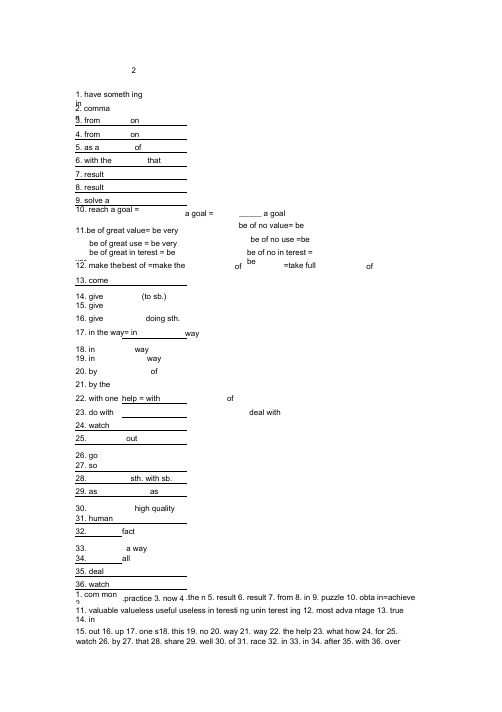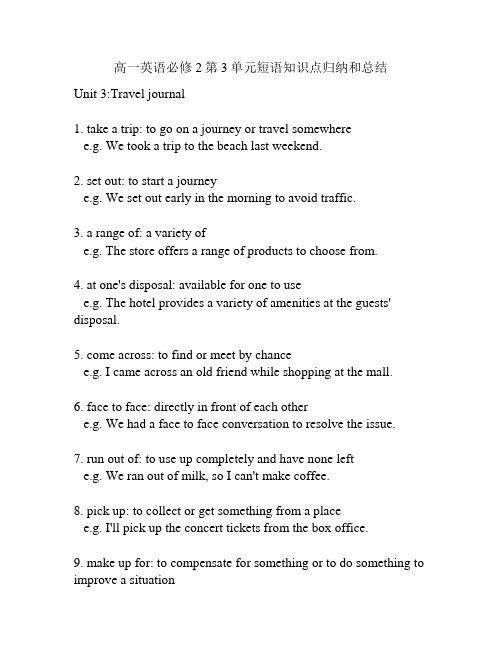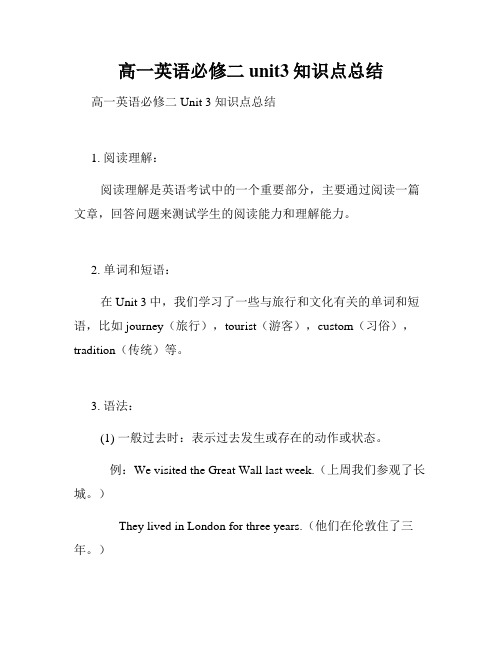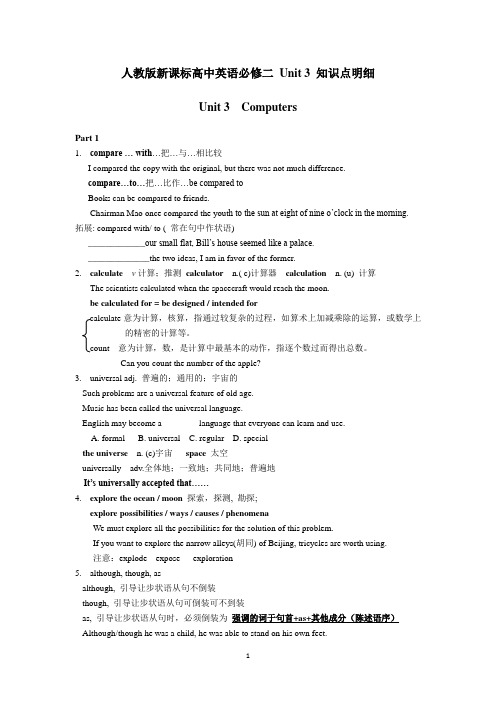高中英语必修二第三单元知识点总结
高中英语必修二第三单元知识点总结

2watch 26. by 27. that 28. share 29. well 30. of 31. race 32. in 33. in 34. after 35. with 36. over3. from on4. from on5. as a of6. with the that7. result 8. result 9. solve a 10. reach a goal =11.be of great value= be very be of great use = be very be of great in terest = be ver 12. make the b est of =make the13. come 14. give (to sb.) 15. give 16. give doing sth. 17. in the way= in 18. in way 19. in way 20. by of 21. by the 22. with one help = with23. do with24. watch 25. out26. go27. so 28. sth. with sb. 29. as as 30. high quality 31. human 32. fact 33. a way34. all35. deal36. watch 1. com mon 2 .practice 3. now 4 1. have someth ing in2. comma n a goal = way _____ a goal be of no value= bebe of no use =be be of no in terest =beofofdeal with=take full of.the n 5. result 6. result 7. from 8. in 9. puzzle 10. obta in=achieve11. valuable valueless useful useless in teresti ng unin terest ing 12. most adva ntage 13. true 14. in15. out 16. up 17. one s18. this 19. no 20. way 21. way 22. the help 23. what how 24. for 25.二、课本知识点归纳和总结1. look after 照顾,照料=care for2. n eed=wa nt=require 需n eed doing =n eed to be done3. a good environment and safety 需要好的环境与安全4. as a result 结果5. endan gered 濒危的6. die out灭绝die off相继死去die of表示死的原因,die后既可接介词of,也可接from, 两者的区别是:一、若死因存在于人体之上或之内(主要指疾病、衰老等自身的原因),一般用介词of。
人教版高中英语必修2Unit3知识点详解

Part 1. Warming up1.In pairs discuss what they have in common.common adj.共同的,普遍的;常见的常用结构:in common 共有,公用(在句中多作状语)have nothing/little/a lot/something in common (with) sb.与某人没有/许多/有些共同之处in common with 和……一样common sense/knowledge 常识common welfare 公共福利Jane and I have nothing in common.=I have nothing in common with Jane. 我与简毫无共同之处。
In common with many young people, he prefers pop songs.和许多年轻人一样,他喜欢流行歌曲。
2.Work out a list and compare it with your partner.compare...with/to...把。
和。
作比较Compare this with/to that, and you’ll find which is better.把这个和那个比较,你就知道哪个更好了。
注意:(1)compare...to...还有“把。
比作。
”之意,不可用compare...with...替换。
Shakespeare compared the world to a stage.莎士比亚把世界比作一个舞台。
(2)过去分词短语compared with(与。
相比)作状语时,可与compared to替换。
Compared with/to most children,she was indeed very unfortunate.与多数孩子相比,她确实很不幸。
3.calculate v.calculate on/uponbe calculated to dobe calculated for适合于,为。
高一英语必修2第3单元短语知识点归纳和总结

高一英语必修2第3单元短语知识点归纳和总结Unit 3:Travel journal1. take a trip: to go on a journey or travel somewheree.g. We took a trip to the beach last weekend.2. set out: to start a journeye.g. We set out early in the morning to avoid traffic.3. a range of: a variety ofe.g. The store offers a range of products to choose from.4. at one's disposal: available for one to usee.g. The hotel provides a variety of amenities at the guests' disposal.5. come across: to find or meet by chancee.g. I came across an old friend while shopping at the mall.6. face to face: directly in front of each othere.g. We had a face to face conversation to resolve the issue.7. run out of: to use up completely and have none lefte.g. We ran out of milk, so I can't make coffee.8. pick up: to collect or get something from a placee.g. I'll pick up the concert tickets from the box office.9. make up for: to compensate for something or to do something to improve a situatione.g. I'll bring you some chocolate to make up for forgetting your birthday.10. go off: to leave or depart, especially suddenly or unexpectedlye.g. They went off on a last-minute vacation.11. break down: to stop functioning or faile.g. My car broke down on the way to work.12. call off: to cancel or stope.g. They called off the meeting due to bad weather.13. set off: to start a journeye.g. We set off early in the morning to avoid traffic.14. end up: to finish or arrive at a certain place or situatione.g. We got lost and ended up in a different city.15. look out: to be careful or watchfule.g. Look out! There's a car coming.16. make use of: to use something effectively or take advantage of an opportunitye.g. I made use of the quiet time to catch up on reading.17. get in touch with: to contact someonee.g. I will get in touch with you as soon as I find out more information.18. make a decision: to choose or decide somethinge.g. It's difficult to make a decision without all the facts.19. check in: to register or report one's arrival at a hotel, airport, etc.e.g. We need to check in two hours before our flight.20. get around: to travel or move from one place to anothere.g. We rented bicycles to get around the city.21. keep up with: to stay updated or not fall behind in knowledge or understandinge.g. I read the news every day to keep up with current events.22. look forward to: to anticipate or feel excited about something in the futuree.g. I'm looking forward to going on vacation next week.23. run into: to meet or encounter unexpectedlye.g. I ran into my old teacher at the supermarket.24. go on: to continue or proceede.g. Let's go on with the meeting.25. drop off: to bring someone or something to a specific place and leave them or it theree.g. I'll drop you off at the train station on my way to work.26. catch up on: to do something that one has not had time for previouslye.g. I need to catch up on my homework this weekend.27. look up to: to admire or respect someonee.g. I look up to my parents for their hard work and dedication.28. turn up: to arrive or appear, especially unexpectedlye.g. He turned up at the party without an invitation.29. find out: to discover or obtain information about somethinge.g. I'll find out the answer and let you know.30. put off: to postpone or delaye.g. They put off the meeting until next week.These are just some of the key phrases from Unit 3: Travel journal in the textbook. Remember to practice using them in context so that you can utilize them naturally in conversations and writing.。
高一英语必修二unit3知识点总结

高一英语必修二unit3知识点总结高一英语必修二Unit 3 知识点总结1. 阅读理解:阅读理解是英语考试中的一个重要部分,主要通过阅读一篇文章,回答问题来测试学生的阅读能力和理解能力。
2. 单词和短语:在Unit 3中,我们学习了一些与旅行和文化有关的单词和短语,比如journey(旅行),tourist(游客),custom(习俗),tradition(传统)等。
3. 语法:(1) 一般过去时:表示过去发生或存在的动作或状态。
例:We visited the Great Wall last week.(上周我们参观了长城。
)They lived in London for three years.(他们在伦敦住了三年。
)(2) 定语从句:用来对主句中的名词或代词进行修饰的从句。
例:The book that he recommended is very interesting.(他推荐的那本书非常有趣。
)The boy whose mother is a doctor wants to be a doctor too.(那个妈妈是医生的男孩也想成为医生。
)(3) 物主代词:用来表示所属关系的代词。
例:This is my book, not yours.(这是我的书,不是你的。
)4. 句型转换:在学习英语中,我们常常需要进行句型的转换,比如从肯定句变为否定句,从陈述句变为疑问句等。
(1) 主动语态和被动语态的转换:例:They built the new stadium last year.(主动语态) The new stadium was built last year.(被动语态)(2) 肯定句和否定句的转换:例:He has finished his homework.(肯定句)He hasn't finished his homework.(否定句)(3) 陈述句和疑问句的转换:例:You have seen the film.(陈述句)Have you seen the film?(一般疑问句)5. 写作技巧:(1) 描述事物:在写作中,我们常常需要描述事物的外貌、特征或者能力。
人教版高中英语高一必修二 Unit 3 知识点整理大全

ariseoftenBook 2 Unit 3 知识点一、重点词汇1. totallyadv. 完全地,整个地a total of 总数为in total=in all 总计;总共As a result I totally changed my shape. 结果,我彻底改变了形状。
2. signalvt.&vt. 发信号 n. 【C 】信号(1)signal (to) sb. to do sth. 示意某人做某事(2)a traffic signal 交通信号send out a signal 发出信号The police signalled to the driver to stop his car by raising his hand. 警察示意司机停车。
3. arisevi. 出现;发生;起身,起床一词多义:(1) Seeing his mother return home, the boy arose from his chair immediately. 起身(2) Once plastic pollution arises in most public areas, it is hard to deal with. 出现(3) They arose at sunrise to get an early start to the park. 起床(4) It can’t be too careful while driving. Accidents from carelessness. 产生易混辨析:原形及含义 过去式 过去分词现在分词arise vi. 出现;发生;起身,起床 aroserise vi. 升起;增长rose raise vt. 举起;抚养;饲养;提高 raisedarousevt. 唤醒;激起arousedarisenrisen raisedarousedarisingrising raisingarousing4. as a result 结果 副词短语,单独使用,相当于一个连词,一般用于句首,且要用逗号与后面的句子隔开。
必修2Unit3重点汇总

3.___________, As a result his father praised him for his progress. resulted in the death of a 4.The accident ___________ passenger. resulted from 5.The accident _______________ his carelessness. 3. in a way 在某种程度上 in the way 挡路;妨碍别人 all the way 一路;自始至终 in no way 决不 lead the way 带路 by the way 顺便说一下 make one’s way to 向…走去 on one’s way to 在去…的路上 (注意 on one’s way home)
4. deal with和do with 词义 处理;对 deal with 付;安排
用法 deal是不及物动词,常与 疑问副词 how 连用。
do with
处理;对 付
do为及物动词,常与疑问 动词 what 连用。
do with I wonder what they will ________the used car. with all the Children must learn how to deal ________ situations in their life. how I don’t know ______to deal with the situation. what I don’t know _______to do with the situation.
6. be of + 抽象名词 用法:(写作亮点) 在抽象名词 use, value, help, importance, difference 等前可用little, some, any, no, great, 等修饰;有的 可用同根形容词代替, be of +抽象名词=be +adj.如: be of value = be valuable be of importance = be important be of use= be useful be of great interest = be very interesting be of great help to sb. = be vey helpful of great importance What he said at the meeting was ___________________. (很重要) is of great help to us The lecture____________________. 这个演讲对我们很有帮助. There is no doubt that _________________________________. her advice is of great value to us 毫无疑问她的建议对我们很宝贵
高二英语必修二Unit3必背知识与学习方法

高二英语必修二Unit3必背知识与学习方法高二是高中学习的关键时期,不仅课程任务重,而且很大程度上打算着同学今后的进展方向,以及能否考入抱负的高校。
接下来我为大家整理了高二英语学习内容,一起来看看吧!高二英语必修二Unit3必背学问重点词汇、短语1. solve 解决;解答2. fromon 从...时起3. as a result 结果4. sothat 如此以至于5. explore 探究,探测,讨论6. anyhow 无论如何,即使如此7. goal 目标,球门,得分8. human race 人类9. signal 发信号,信号10. type 类型,打字11. in a way 在某种程度上12. arise 消失,发生13. with the help of 在...的关心下14. electronic 电子的15. deal with 处理16. watch over 看管,监视17. rise/arise/arouse/raise的区分重点句型1. certain和sure的句型sb. be sure/certain of= sb. be sure/certain that从句:某人确信be sure/certain to do sth. 确定会做Its certain that从句确定会Its certain that he will succeed.=Hes sure/certain to succeed.他确定会胜利的.Im sure/certain of his success.= Im sure/certain that he will succeed. 我确信他会胜利的2. 主语+ be + adj + to do The question is easy to answer.3. 状语从句的省略在when, while, if, unless, though, once等引导的状语从句中,假如从句的主语和主句的主语全都, 且从句中的谓语含有be动词时, 为了使句子简洁, 可省略从句中的主语和be动词。
人教高中英语必修二Unit3课本知识点总结

必修二Unit3课本内容复习一. 词汇变形1. calculate v. 计算-- calculation n.计算;推算-- calculator n. 计算器2. application n. 应用;用途;申请-- apply v. 应用;试用;申请-- applicant n.申请人3. explore v. 探索;探测-- exploration n. 探索-- explorer n. 探险者4. arise v.出现;发生产生--arose(过去式)--arisen (过去分式)5. intelligent adj. 聪明的;智能的-- intelligence n. 智力6. simple adj. 简单的;简朴的-- simplify v. 使简化-- simply adv. 仅仅;简直--simplicity n.简单7. solve v. 解决,处理-- solution n. 解决办法;答案8. real adj. 真正的;真实的-- realize v. 实现--reality n.现实;事实-- realization n. 实现;领悟9. explore v. 探索-- exploration n. 探索;探测-- explorer n. 探险者;勘探者;考察者10. person n. 人;个人-- personal adj. 个人的--personally adv. 就个人而言11. universal adj. 普遍的-- universe n.宇宙12. operate v. 操作-- operator n.操作员二. 重点短语1. have...in common 有相同的特征(或特点)have much/a lot/ something/little/nothing in common with...与.... 有许多/一些/很少/没有相同之处【拓展】in common with...与....相同in common 共有;公有common sense 常识2. calculate v. 计算【拓展】calculation n.【C, U】计算;预测calculator n.计算器3. solve v. 解决,处理;解答搭配:solve a problem 解决问题remain to be solved 有待解决【拓展】solution n. 解决办法;答案the solution to sth. ....的解决办法【课堂练习】单句语法填空1. By his _____________(calculate), it could save airlines hundreds of millions of dollars a year.2. It ____________(calculate) that more and more people will shop at home instead of going tothe shopping center.3. The team are working hard to analyze the problem so that they can find the best __________(solve).4. With all the problems ____________(solve), he would have nothing to worry about.5. There are still many problems _________ (solve) before we are ready for a long stay on the moon.6. The teacher classified the words and ___________(simple) their usage so as to make them more easily to be grasped by his students.1. calculation.2. is calculated.3. solution.4. solved.5. to be solved.6. simplified4. go by (时间)流逝,过去e.g.Things will get easier as time goes by. 随着时间的推移,情况会有所改善。
2019新人教版高中英语必修2Unit3单元重点知识点归纳总结(因特网单元小结)

新人教版Book 2 Unit 3单元知识点小结一.词汇I. 阅读词汇——明确含义,易混词,重点词1.stream vt.流播;流出vi.流动n.小河;溪流2.cash n.现金;金钱3.update vi.更新;向…提供最新信息n.更新;最新消息4.database n.数据库;资料库5.software n.软件6.charity n.慈善;慈善机构(或组织7.conference n.会议;研讨会;正式会谈8.resident n.居民;(美国的)住院医生adj.(在某地)居住的9.battery n.电池10.discount n.折扣vt.打折11.target n.目标;对象;靶子vt.把…作为攻击目标12.upset adj.心烦的;苦憶的;沮丧的vt.( upset,upset)使烦恼;使生气;搅乱13.tip n.忠告;诀窍;实用的提示II. 推展词汇—灵活运用1.blog(n.)博客vt.写博客blogger(n).博客作者,博主2.engine (n.)引撃;发动机;火车头engineer (n).工程师engineering (n).工程,工程学3.identity (n.)身份,个性identify(v)确定,鉴定,识别,辨认出4.convenient (adj.)方便的,便利的convenience (n).便利,方便5.surf(v)冲浪,浏览surfer(n)冲浪运动员,乘冲浪板冲浪的人,(互联网上)冲浪者6.access (n.)通道;(使用、查阅、接近或面见的)机会(vt).进入;使用;获取accessible (adj).易接近的;可进入的;可理解的7.function (n.)功能;作用;机能(vi.)起作用;正常工作;运转functional (adj.)功能的8.confirm (v).确认,事确信confirmation (n).确认,证实,证明9.privacy (n).隐私,私密private( adj).私有的,私人的,私立的privately( adv).10.particular (adj.).特定的,特别的,讲究的particularly (adv).异乎寻常地;特别是;明确地11.embarrassing (adj).让人难堪(尴尬;害羞)的embarrassed (adj.)adj.尴尬的;窘迫的embarrassment (n). 尴尬,窘迫embarrass (v).使尴尬,使窘迫12.guideline (n). 准则,指导原则guide (n.)指南,向导(v)引导,带领13.stuck (adj.)卡住,陷于,困于stick (v).刺,戳;伸出;粘贴,坚持;伸出;粘住(n.) 棍,手杖14.rude(adj) 粗鲁的,无礼的rudeness (n).无礼,野蛮15.press (v). 按,压,敦促(n)报刊杂志;印刷机;新闻界出版社;拥挤的人群16.tough(adj.)艰难的;严厉toughness (n).韧性;强健;有粘性III.重点词汇——用法归纳1.chat(vi). 聊天,闲聊chat with/to sb. 和某人闲聊chat about sth/sb. 闲聊某事/某人2.stuck (adj.)卡住,陷于,困于stuck on sth. 被难住,答不上来stuck for sth, 不知所措,为某事犯愁3.benefit ( n.)益处(vt.)使受益(vi)得益于benefit from (doing) sth. 从某事中获益benefit sb./sth. 对某人或某事有益be of benefit 有益处for the benefit of 为了..的利益或好处have the benefit of 得益于,占…的光4.inspire(v). 鼓舞,激励,启发思考inspiration (n.) 灵感;鼓舞;妙计\ inspire sb. to do sth. 鼓舞某人干某事inspire sb. with sth, 使产生(感觉或情感)5.account (n.) 账户,描述(v).解释,导致,认为,把…视为account for sth. 是…的原因6.familiar (adj.) 熟悉,熟知be familiar with sth. 通晓。
人教版高中英语必修2unit3课文知识点详解

5.What’s more,you can use the Internet to
learn English.而且,你还能利用因特网学英语。 考点提炼 What is more意为“ 更重要的是;而 且 ”,常作 插入 语,相当于besides或 furthermore。
导练互动
重点单词 1.calculate
I arose early in the morning.
我早上起得很早。
归纳总结 arise vi.出现,发生;上升 。 (1)作“呈现;出现;发生”之意时,主语多为以下 抽象名词: argument/problem/quarrel/question/movement。 (2)arise from由……而引起,由……而产生;
Unit 3
Ⅰ.高频单词思忆
Computers
基础落实
1.The development of the steam engine was a great technological (科技的) advance. 2.I haven’t calculated (计算) the result of the maths problem. 3.Life totally/completely (完全地) changed
是我的一切。
with the help of my electronic brain which neverwhich forgets anything 是状语, never forgets 说明主谓部分的伴随状况。在这个 with短语中, anything 包含一个定语从句
在……的帮助下
,修饰my electronic brain 。
(2)sign用法最广,可以指符号,也可以指情绪、性
人教版新课标高中英语必修二 Unit 3 知识点明细

人教版新课标高中英语必修二Unit 3 知识点明细Unit 3 ComputersPart 1pare … with…把…与…相比较I compared the copy with the original, but there was not much difference.compare…to…把…比作…be compared toBooks can be compared to friends.Chairman Mao once compared the yout h to the sun at eight of nine o’clock in the morning.拓展: compared with/ to ( 常在句中作状语)_____________our small flat, Bill’s house seemed like a palace.______________the two ideas, I am in favor of the former.2.calculate v计算;推测calculator n.( c)计算器calculation n. (u) 计算The scientists calculated when the spacecraft would reach the moon.be calculated for = be designed / intended forcalculate意为计算,核算,指通过较复杂的过程,如算术上加减乘除的运算,或数学上的精密的计算等。
意为计算,数,是计算中最基本的动作,指逐个数过而得出总数。
Can you count the number of the apple?3.universal adj. 普遍的;通用的;宇宙的Such problems are a universal feature of old age.Music has been called the universal language.English may become a ________language that everyone can learn and use.A. formalB. universalC. regularD. specialthe universe n. (c)宇宙space太空universally adv.全体地;一致地;共同地;普遍地It’s universally accepted that……4.explore the ocean / moon探索,探测, 勘探;explore possibilities / ways / causes / phenomenaWe must explore all the possibilities for the solution of this problem.If you want to explore the narrow alleys(胡同) of Beijing, tricycles are worth using.注意:explode expose exploration5.although, though, asalthough, 引导让步状语从句不倒装though, 引导让步状语从句可倒装可不到装as, 引导让步状语从句时,必须倒装为强调的词于句首+as+其他成分(陈述语序)Although/though he was a child, he was able to stand on his own feet.Child as/ though he was, he was able to stand on his own feet.Young as he is ,he knows a lot.Hard as he worked, he failed finally.Try as he might, he failed finally.6.simplify vt.简化simple adj 简单的simply adv 简单地The law needs to be simplified.A great life is the result of simplifying your life.7.sum n. (c)The sum of seven and twelve is nineteen.You will be fined the sum of 200 dollars.in sum总而言之In sum, theory should be combined with practice.To sum up, there are three main ways of solving the problem.概括来说,这个题主要有三种解决办法。
高中英语必修二第三单元知识点总结

高一英语必修2 第三单元短语和知识点归纳和总结第三单元短语和知识点归纳和总结一、重点短语归纳和总结一、重点短语归纳和总结1. have something in _________ 和……有共同之处2. comman ______ 惯例惯例惯例 3. from ______ on 从现在起从现在起4. from ______ on 从那时起从那时起5. as a _______ of 作为……的结果6. with the _______ that 结果是结果是7. result ___________ 由……造成;因……而产生由……造成;因……而产生 8. result ____________ 引起(某种结果)引起(某种结果);使获得(某种结果);使获得(某种结果) 9. solve a _________ 猜字谜猜字谜10. reach a goal =__________ a goal = ___________ a goal 实现目标实现目标11.be of great value= be very ___________ be of no value= be ______________ be of great use = be very _____________ be of no use =be __________ be of great interest = be very __________ be of no interest = be _______________ 12. make the best of =make the __________ of 充分利用= take full __________ of 13. come ____________ 实现;成为现实实现;成为现实实现;成为现实 14. give ________ (to sb. ) 成交;成交; 交上;交上; 屈服;屈服; 让步让步15. give __________ 分发;分发;分发; 发出气味热等;发表公布;耗尽;筋疲力尽 16. give _________ doing sth. 放弃;不再做……17. in the way= in __________ way 挡道;妨碍挡道;妨碍18. in ________ way 用这种方法用这种方法19. in _________ way 绝不绝不20. by _________ of 经由;经由; 通过……方式21. by the _______ 顺便提一下;顺便提一下; 另外另外22. with one ’ help = with _____ ______ of 在……的帮助下23. do with 常与连接代词常与连接代词_________ 连用;连用; deal with 常与连接副词________ 连用。
- 1、下载文档前请自行甄别文档内容的完整性,平台不提供额外的编辑、内容补充、找答案等附加服务。
- 2、"仅部分预览"的文档,不可在线预览部分如存在完整性等问题,可反馈申请退款(可完整预览的文档不适用该条件!)。
- 3、如文档侵犯您的权益,请联系客服反馈,我们会尽快为您处理(人工客服工作时间:9:00-18:30)。
高一英语必修2 第三单元短语和知识点归纳和总结一、重点短语归纳和总结1. have something in _________ 和……有共同之处2. comman ______ 惯例3. from ______ on 从现在起4. from ______ on 从那时起5. as a _______ of 作为……的结果6. with the _______ that 结果是7. result ___________ 由……造成;因……而产生8. result ____________ 引起(某种结果);使获得(某种结果)9. solve a _________ 猜字谜10. reach a goal =__________ a goal = ___________ a goal 实现目标of great value= be very ___________ be of no value= be ______________be of great use = be very _____________ be of no use =be __________be of great interest = be very __________ be of no interest = be _______________12. make the best of =make the __________ of 充分利用= take full __________ of13. come ____________ 实现;成为现实14. give ________ (to sb. ) 成交;交上;屈服;让步15. give __________ 分发;发出气味热等;发表公布;耗尽;筋疲力尽16. give _________ doing sth. 放弃;不再做……17. in the way= in __________ way 挡道;妨碍18. in ________ way 用这种方法19. in _________ way 绝不20. by _________ of 经由;通过……方式21. by the _______ 顺便提一下;另外22. with one’ help = with _____ ______ of 在……的帮助下23. do with 常与连接代词_________ 连用; deal with 常与连接副词________ 连用。
24. watch ______ 期待;等候25. ________ out 注意;小心(用于提醒某人)26. go ______ 走过;经过27. so ……_________ ……如此;以至于28. _________ sth. with sb. 与某人分享某物29. as __________ as 也;和;既……又……30. __________ high quality 高质量的31. human _______ 人类32. _______ fact 事实上;实际上33. ________ a way 在某种程度上34. _______ all 毕竟35. deal _______ 处理;对付36. watch __________ 看守;监视1. common2. practice3. now4. then5. result6. result7. from8. in9. puzzle 10. obtain=achieve 11. valuable valueless useful useless interesting uninteresting 12. most advantage 13. true 14. in 15. out 16. up 17. one’s 18. this 19. no 20. way 21. way 22. the help 23. what how 24. for 25. watch 26. by 27. that 28. share29. well 30. of 31. race 32. in 33. in 34. after 35. with 36. over二、课本知识点归纳和总结1. look after 照顾,照料=care for2. need=want=require 需要 need doing =need to be done3. a good environment and safety 需要好的环境与安全4. as a result 结果5. endangered 濒危的6. die out 灭绝 die off 相继死去 die of 表示死的原因,die 后既可接介词 of,也可接 from, 两者的区别是:一、若死因存在于人体之上或之内(主要指疾病、衰老等自身的原因),一般用介词 of。
如:die of illness (heart trouble, cancer, a fever, etc) 死于疾病 (心脏病,癌症,发烧等)二、若死因不是存在人体之内或之上,而是由环境造成的(主要指事故等方面的外部原因),一般用介词 from 。
如: die from an earthquake (a traffic accident, a lightning,a stroke, etc) 死于地震(交通事故,雷击等)三、若死因是环境影响到体内,即两方面共有的原因,则可用 of, from 均可。
如:die of [from] a drink ( a wound, overwork, starvation, hunger and cold, etc) 死于饮酒(受伤,劳累过度,饥饿,饥寒等)但是在实际运用中,两者混用的情况较多。
7. a report on sth 一个关于……的报告8. too much后加名词,much too 后加adj或adv. too much dust 太多灰尘9. remain to be seen 有待于拭目以待10. in peace 处于和平状态没有in the peace, 没有in peace of 这样的表达11. know of = know about 知道了解12. in danger of 面临危险13. had always longed to do sth. always 总是,这是完成时的标志。
by +时间, since 都是完成时的标志。
14. wake up 睡醒15. a flying carpet 一个飞毯16. take sb. to sp. 带某人去某地17. at once 立刻,马上18. fly away 飞走了19. see an antelope looking sad see sb. doing sth. 看到某人正在做某事20. make sweaters 制作毛衣21. so ……that 如此……以至于22. next minute 用作连词,表示转眼间23. turn around 转身24. take my photo 照相25. in relief 如释重负,松了口气26. burst into laughter 突然大笑起来27. used to do sth. 通常干某事28. without mercy 毫无仁慈 have mercy on sb. 对某人又仁慈之心29. only a certain number of sth. 只有少数的某物 only+单个主语不倒装, only + 状语或状语从句放于句首时,倒装主语,不倒装从句。
30. suggest 一是表“建议”,二是表“表明”。
suggest doing 建议干某事表建议:可接that 宾语从句,that从句用should+动词原形,should可以省略.She suggested that the class meeting (should) not be held on Saturday. 她建议班会不要在星期六举行.表"暗示、表明"的意思.其主语往往是事物,而不是人.1)接名词或动名词作宾语.The simple house suggested a modest income. 这座简朴的房子表明(房主的)收入并不高.Her pale face suggested bad health. 她脸色苍白,看来身体不好.The thought of summer suggests swimming. 一想到夏天就使人们联想到游泳.31. news 不可数名词,一条新闻 a piece of news32. protect sb. from sth. 保护某人免受某事protect sb. from doing sth.prevent sb. from doing sth= stop sb. from doing sth. 阻止某人干某事=keep sb. from doing sth.33. mosquitoes 复数形式+es34. over my body 遍及全身35. affect=have an effect on 影响36. pay more attention to更多注意37. appreciate doing sth. 欣赏,感激某事 I appreciate it if 其中it 做形式宾语38. no rainforest, no animals, no drugs. 没有雨林,就没有动物,也就没有药物了。
39. disappear 系动词,无被动语态,不用于进行时40. do harm to sth. 对某物有害 be harmful to sth. 对某物有害,注意介词一定用to.41. sell well 很畅销,完成时态:has sold very well42. go down to 下降到43. tens of thousands of 成千上万的44. come into being 开始形成,产生45. a number of 许多的后加可数名词的复数形式46. not only but also 不但……而且47. in such a short time 在如此短的时间48. according to 根据,按照49. some reason 某个原因= a certain reason 某个原因50. survive sth. 经历……得以幸存 survive the earthquake, accident, rainstorm 等Once, lately at night, an Englishman came out of his room into a passage of the hotel and ask the servant to bring her a glass of water. The servant did like he was asked. The Englishman returned his room, and a few minutes later he came into the passage again and once more asked the servant a glass of water. Every a few minutes the Englishman would come out of his room and repeated his request. After half an hour the astonishing servant decided to ask the man what he was doingwith the water. "Nothing," answered him calmly. "It's simply that the room is on fire.The most widespread fallacy(谬论)of all is that colds are caused by cold. They are not. They are caused by viruses passing on from person to person. You catch a cold by coming into contact, directly or indirectly, with someone who already has one. If cold causes colds, it would be reasonable to expect the Eskimos to suffer from them forever. But they do not. And in isolated arctic regions explorers have reported people are free from colds until they come into contact again with infected people from the outside world by way of packages and mails dropped from airplanes.During the First World War soldiers who spent long periods in the trenches (战壕), cold and wet, showed no increased tendency to catch colds.In the Second World War prisoners at the Auschwitz concentration camp, naked and starving, were astonished to find that they seldom had colds. At the Common Cold Research Unit in England, volunteers took part in experiments in which they gave themselves to the discomforts of being cold and wet for long stretches of time. After taking hot baths, they put on bathing suits, allowed themselves to be with cold water, and then stood about dripping wet in a drafty(通风良好的)room. Some wore wet socks all day while others exercised in the rain until close to exhaustion. Not one of the volunteers came down with a cold unless a cold virus was actually dropped in his nose.If, then, cold and wet have nothing to do with catching colds, why are they more frequent in the winter?Despite the most pains-taking research, no one has yet found the answer. One explanation offered by scientists is that people tend to stay together indoors more in cold weather than at other times, and this makes it easier for cold viruses to be passed on.31. The writer offered _______ examples to support his argument.A. 4B. 5C. 6D. 732. Which of the following is TRUE according to the passage?A. The Eskimos suffer from colds from time to time.B. Colds are not always caused by cold.C. People suffer from colds just because they like to stay indoors.D. A person may catch a cold by touching someone who already has one.33. Arctic explorers may catch colds when they are _______.A. working in the isolated arctic regionsB. writing reports in terribly cold weatherC. free from work in the isolated arctic regionsD. coming into touch again with the outside world34. Volunteers taking part in the experiments in the Common Cold Research Unit_______.A. suffered a lotB. never caught coldsC. often caught coldsD. became very strong35. The passage mainly discusses _______.A. the experiments on the common coldB. the fallacy about the common coldC. the reason and the way people catch coldsD. the continued spread of common colds通知1.假如你校学生会(Students’ Union)要举办一次英语演讲比赛(contest),请你用英语写一篇书面通知,以便张贴到布告栏上。
